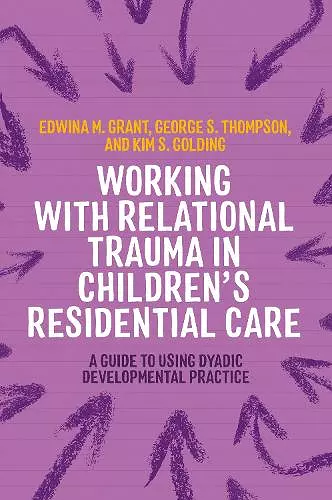Working with Relational Trauma in Children's Residential Care
A Guide to Using Dyadic Developmental Practice
George Thompson author Kim S Golding author Edwina Grant author
Format:Paperback
Publisher:Jessica Kingsley Publishers
Published:21st May '24
Should be back in stock very soon

A guide for therapists and residential care workers on how DDP can be used in residential care settings with children who have experienced developmental trauma.
A guide to the theory, development, and application of dyadic developmental psychotherapy (DDP) in children's residential care services. From using the PACE model in conversations to balancing emotional regulation with physical safety in secure homes, this book explores the theory and practicalities of supporting children in residential care.
Dyadic Developmental Psychotherapy (DDP) is a therapeutic approach, based in attachment theory, which is used to support children who have experienced relational trauma. By consciously offering PACE (playfulness, acceptance, curiosity, and empathy), adults can help children - and each other - to feel more secure and open to others.
This guide provides an overview of DDP and explores how it can be used to support children in residential care settings. Case studies, examples, and expert guidance from the authors' extensive experience demonstrate how to apply the principles of DDP to daily practice. From integrating the PACE model into conversations - both with children and colleagues - to balancing physical safety with relational safety in secure care situations, this book offers a way to build a culture of support throughout the whole structure of residential care settings.
This is a wonderful book that affirms the importance of DDP in the relationships of children in out of home care. It also explores the beautiful themes that shape the identity and capacities of children - love, trust, shame. It offers direct applications of DDP for practitioners in this context. Kim Golding and her colleagues reflect on the how relationships have the power to transform childhood pain and trauma into meaning that heals. -- Dr Joe Tucci, CEO of the Australian Childhood Foundation
This book will be of great value not only in residential care but anywhere where DDP is practiced. Based on the authors' wealth of experience this book is full of conversations and stories that beautifully illustrate DDP principles to practice, whilst providing safety and new knowledge of self and other. -- Dan Hughes, Ph.D. Founder of DDP
Grant, Thompson, and Golding present an innovative exploration in Working with Relational Trauma in Children's Residential Care, skilfully uncovering the transformative impact of Dyadic Developmental Psychotherapy (DDP) on the lives of children in residential care. This timely and accessible book seamlessly blends DDP with insights from contemporary neuroscience, providing a fresh perspective on applying these principles to therapeutic environments for children with profound trauma experiences. The authors showcase the remarkable effectiveness of the DDP approach, cultivating a therapeutic atmosphere that warmly and playfully invites children into a realm of safety. Through co-regulation and a 'symmetry' of presence with the child, their approach encourages children to process their trauma-related experiences, creating an environment where they can securely embark on a journey of emotional healing and growth. -- Stephen W. Porges, PhD. Founding Director, Traumatic Stress Research Consortium
If you care about children, please take this book with you wherever you go and devour it. You'll learn that residential treatment is not a place of last resort; it can be a place that gives rise to hope. -- Jonathan Baylin, coauthor of Attachment-Focused Therapy
This is a must have for any residential setting that is looking to embed or introduce therapeutic care. This is wonderfully written by Kim, Edwina and George who have a wealth of expertise that enriches each chapter and creates a fantastic guide for all practitioners. -- Anthony Small, Registered Manager
"This is one of the most comprehensive and valuable guides to DDP I have read." * Jeanine Connor MBACP - Therapy Today *
ISBN: 9781787755598
Dimensions: 228mm x 150mm x 18mm
Weight: 400g
272 pages